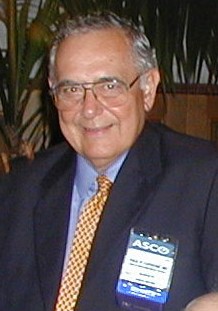
Paul Peter Carbone was born in White Plains, N.Y., on May 2, 1931. Dr. Carbone received his B.A. from Union College, Schenectady, NY in 1952. He received his medical degree from Albany Medical College in 1956, and served his internship and residency at the U.S. Public Health Service Hospitals in Baltimore and San Francisco.
Dr. Carbone began his career at the National Cancer Institute in 1960 where he became head of its Medicine Branch. While he was at NCI, he achieved recognition for his work in the treatment and cure of Hodgkin’s disease, development of new chemotherapy drugs, and adjuvant treatment of breast cancer. For this achievement, he shared the Lasker Prize for Medicine in 1972.
In 1971, Dr. Carbone founded the Eastern Cooperative Oncology Group, which he built into a premier national clinical trials organization, conducting clinical trials in over 300 hospitals and medical schools. He served as the elected chairman of ECOG for 20 years. With ECOG, he pioneered research on a number of fronts and provided sustained leadership at the international level. He also served as Chairman of the Breast Cancer Task Force and was influential in directing research policy and instrumental in the initial studies of successful adjuvant chemotherapy for breast cancer. In 1976, Dr. Carbone joined the University of Wisconsin, one of the first National Cancer Institute designated Comprehensive Cancer Centers, as the head of Medical Oncology. He became Chair of the Department of Human Oncology in 1977 and Director of the University of Wisconsin Comprehensive Cancer Center from 1978 to 1997.
In addition to the Lasker award, his international awards include the Hilda and Richard Rosenthal Award of the American Association of Cancer Research, Medal of Honor for Clinical Research from the American Cancer Society, Distinguished Service Award for Scientific Achievement for the American Society of Clinical Oncology, a Mastership in the American College of Physicians, and the Health Medal of the First Order, Executive Yuan, Republic of China. He also served as president of the two most prestigious cancer research societies in this country: the American Society of Clinical Oncology (ASCO) and the American Association for Cancer Research. Dr. Carbone also was proud to have served on the first certifying committee of the American Board of Internal Medicine for Medical Oncology where he helped write the first qualifying exam and define the national standards for medical oncology. In 2000, he was awarded the Folkert O. Belzer Lifetime Achievement Award for outstanding and enduring contributions to academic medicine. He was also the Editor-in-Chief of Oncology, the international journal of cancer and was on the editorial board of several journals, including the Journal of Clinical Oncology, Cancer Research, and the International Journal of Radiation Oncology, Biology and Physics.
Dr. Carbone is known throughout the world as an outstanding clinician, teacher and administrator in addition to his scientific contributions and he has published more than 300 scientific papers and 86 book chapters. He was also very gratified to have trained oncologists at the Taiwan Academy of National Sciences, the National University of Singapore and throughout the United States.
Since Dr. Carbone’s “retirement” from the University of Wisconsin in 1998, he obtained two new grants from the NIH to conduct clinical trials in preventive chemotherapy for bladder cancer and skin cancer which each involve more than 330 patients. Dr. Carbone also was the Managing Director of the nonprofit organization Frontier Science & Technology Research Foundation for over 20 years. The Foundation is currently engaged in large-scale national and international clinical trials that have direct impact upon the treatment of thousands of cancer and AIDS patients in several hundred institutions. He also continued his leadership roles in Wisconsin by raising funds for the HealthStar building campaign, developing the state’s tumor registry, the Wisconsin Cancer Council and the Tobacco Coalition and establishing the UW’s Center for Tobacco Research and Intervention. He was also instrumental in the development of the Don and Marilyn Anderson Hospice Center in Fitchburg.
In his many years as an outstanding scientist, administrator, teacher and clinician with worldwide recognition, Dr. Carbone was his most successful at the bedside of the patients who needed and loved him. Dr. Carbone excelled at his work not for recognition, but out of a burning desire to assist those in need and out of a sense of justice and fairness.
